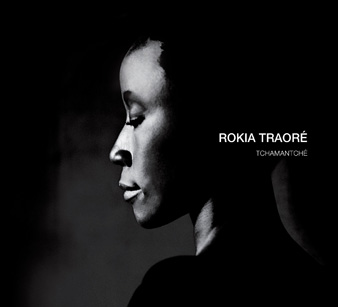Rokia Traoré's recent Nonesuch release, Tchamantché, receives an 8.4 from Pitchfork, asserting that her "sense of independence has imbued her music with a special quality that sets it apart from that of many of her erstwhile peers." The review cites the album's "gorgeous guitar tones and Traoré's quiet vocals. These twin strands of transnational DNA—guitar plus vocals—wend through all music, but here they're made more entrancing by Traoré's refusal to abandon her roots while at the same time working subtly but assiduously to build upon them."
Rokia Traoré's recent Nonesuch release, Tchamantché, receives an 8.4 from Pitchfork. Reviewer Joshua Klein suggests that, while Traoré has a great tradition of West African performers against which to be measured—"Mali alone is home to so many spectacular musicians it boggles the mind."—her unique abilities make her stand out even when judged in that regard.
"Traoré gravitated toward music independently, as a college student," Klein reports, "and that same sense of independence has imbued her music with a special quality that sets it apart from that of many of her erstwhile peers."
He describes Tchamantché as "a guitar album, albeit a guitar album of a particularly understated bent ... hauntingly spare yet ridiculously well-defined, the timbre and tone of every string presented in perfect resolution, the occasional accompaniment of a rhythm section or Sly Johnson's human beatbox reserved but wholly effective."
Nevertheless, even with the centrality of Rokia's Gretsch guitar on the album, her vocals draw the listener in, "powerful without over-projecting, forcing you to meet her halfway rather than wait passively for her to bowl you over."
Klein notes her performance, in English, of the Gershwins' "The Man I Love" as "a testament to the borderless nature of all great music." He concludes:
An artist of less integrity might have recorded an entire album of Holiday songs, or more songs sung in English, but Traoré doesn't seem inclined to go that route. There's no need to pander, since the same qualities that make that cover so special flow throughout Tchamantché, namely those gorgeous guitar tones and Traoré's quiet vocals. These twin strands of transnational DNA—guitar plus vocals—wend through all music, but here they're made more entrancing by Traoré's refusal to abandon her roots while at the same time working subtly but assiduously to build upon them.
Read the complete review at pitchforkmedia.com.
- Log in to post comments



